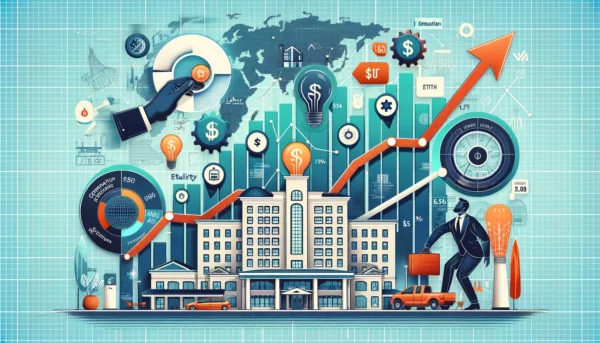In the face of an ever-evolving economic landscape, hoteliers across the globe are confronting one of the industry’s most persistent challenges: rising operational costs. These increasing costs are influenced by a variety of factors from CapRates to labor. This not only put pressure on profitability, but it also compels hoteliers to rethink their operational strategies. This article delves into the root causes behind the surge in expenses, examines their broader implications for the hospitality sector, and outlines actionable strategies for mitigating their impact. Through a comprehensive analysis and strategic insights, we aim to empower hoteliers to navigate these challenges effectively, optimizing their operations for sustainability and growth in a competitive market.
The Surge in Operational Costs: Unpacking the Drivers
The hospitality industry, much like other sectors, is grappling with the ripple effects of global economic shifts. Several key factors contribute to the rise in operational costs such as:
- Labor Costs: Labor remains one of the most significant expenses for hotels, exacerbated by the industry’s high turnover rates and the increasing demand for higher wages. The challenge of filling vacancies, particularly during peak seasons, adds another layer of complexity, driving up costs further.
- Utility and Maintenance Expenses: Energy costs, a substantial component of hotel operations, have soared due to rising global oil prices. Additionally, the cost of maintaining and replacing essential equipment and systems has increased, impacting the bottom line.
- Technology Adoption: In the quest for efficiency and enhanced guest experiences, hotels are investing in technology. From property management systems (PMS) to guest service automation, these technological advancements, while beneficial, come with significant upfront and ongoing expenses.
- Inflation: The overall economic environment, marked by inflation, has led to higher costs for goods and services essential to hotel operations, including food, linens, and cleaning supplies.

These factors collectively exert pressure on hotel profitability, making the management of operational expenses a priority for hoteliers.
Operational costs and Their Impact on CapRates
CapRates serve as a pivotal metric for investors in the hotel industry, offering a snapshot of a property’s profitability and potential return on investment. Essentially, the CapRate is determined by dividing the Net Operating Income (NOI) of a property by its current market value. This simple yet powerful figure can significantly influence investment decisions, property valuations, and perceptions of market health. However, as operational costs rise, the intricate balance between maintaining a healthy CapRate and operational sustainability becomes increasingly challenging.
The Direct Impact of Rising Operational Costs
Rising operational expenses directly reduce a hotel’s NOI, the numerator in the CapRate calculation. Since NOI is essentially the hotel’s revenue minus operating expenses (excluding mortgage payments and taxes), any increase in costs without a proportional increase in revenue diminishes profitability. For instance, spikes in labor costs, utility bills, and the need for technological upgrades can quickly erode the hotel’s bottom line. As the NOI decreases due to these rising costs, the CapRate, in turn, can experience a downward pressure, assuming the property’s market value remains constant.
Market Value Considerations
The relationship between operational costs and CapRates also extends to the property’s market value, the denominator in the CapRate calculation. Investors often view properties with high operational efficiency and lower expenses as more desirable, potentially driving up the market value. Conversely, if a hotel is seen as having inefficiencies and high running costs, its attractiveness to investors may decrease, potentially lowering its market value. This depreciation, combined with a reduced NOI, can further negatively affect the CapRate.
Investor Perception and Future Expectations
Investor perception plays a critical role in determining both the NOI and market value components of CapRates. As operational costs rise, investors may revise their expectations for future profitability downwards. This adjustment can lead to a reassessment of the hotel’s worth, with a focus on the increased risk associated with higher operating expenses. Investors seeking to maintain their yield expectations might demand a higher CapRate to compensate for the perceived increased risk, affecting the overall valuation and marketability of the property.
Optimizing Labor Costs: A Key to Efficiency
Labor costs represent a significant portion of operational expenses for hotels. Addressing this requires innovative scheduling and training approaches:

- Smart Scheduling: Utilize predictive analytics from your property management systems (PMS) to forecast demand and adjust staffing levels accordingly. This can reduce overstaffing during low-occupancy periods and ensure adequate staffing during peak times.
- Cross-Training Staff: By training employees to perform multiple roles, hotels can increase operational flexibility and reduce the need for specialized staff for each function.
- Enhancing Employee Retention: Implementing a positive onboarding experience and continuous training can improve employee satisfaction and reduce turnover, consequently lowering the costs associated with hiring and training new staff.
Leveraging Technology to Drive Efficiency
Technology can play a crucial role in reducing operational costs through automation and efficiency improvements:
- Automated Guest Services: Implement check-in kiosks, mobile check-in/out, and AI-driven customer service solutions to reduce the need for front desk staff and improve guest satisfaction.
- Energy Management Systems: Invest in smart energy management solutions to monitor and control energy use, significantly reducing utility costs.
- Predictive Maintenance: Utilize IoT devices and analytics to predict and prevent equipment failures, avoiding costly emergency repairs and downtime.
Sustainable Practices: A Path to Cost Reduction
Sustainability is not just an environmental responsibility; it’s a strategy for cost control:
- Energy-Efficient Appliances: Upgrading energy-efficient lighting, HVAC systems, and appliances can lead to substantial savings on utility bills.
- Waste Reduction: Implementing recycling programs and reducing food waste not only benefits the environment but also decreases disposal and purchasing costs.
- Water Conservation: Low-flow fixtures and water management systems can significantly reduce water usage and associated costs.
Tailoring Strategies to Hotel Types
Different types of hotels—luxury, mid-range, and budget—will have varying approaches to managing operational expenses:
- Luxury Hotels: May focus on enhancing guest experiences through technology and personalized services while optimizing backend operations for efficiency.
- Mid-Range Hotels: Can benefit from a balanced approach, leveraging technology for guest services and operational tasks to maintain quality at a lower cost.
- Budget Hotels: Should prioritize cost-effective operational strategies, such as energy conservation and streamlined processes, to keep room rates competitive.
Embracing the Future: Innovation and Sustainability in the Hotel Industry
The hotel industry stands at a pivotal juncture, faced with the dual challenges of rising operational expenses and the imperative for environmental sustainability. Yet, within these challenges lies a tremendous opportunity for innovation, efficiency, and growth. By adopting strategic cost-control measures, leveraging cutting-edge technology, and committing to sustainable practices, hoteliers can not only navigate the complexities of today’s economic landscape but also set a new standard for the hospitality industry.
The path forward for the hotel industry is one of adaptation and innovation. As hoteliers embrace new technologies and sustainable practices, they will not only mitigate the impact of rising operational expenses but also enhance their competitive edge. The future is bright for those who invest in efficiency and sustainability, with the promise of a hotel industry that is both economically vibrant and environmentally responsible.
For more insights and strategies tailored to the hotel industry, feel free to visit our resources at NewGen Advisory or contact us today to stay ahead of the curve in this ever-evolving sector.


